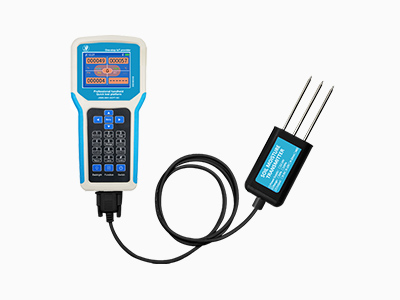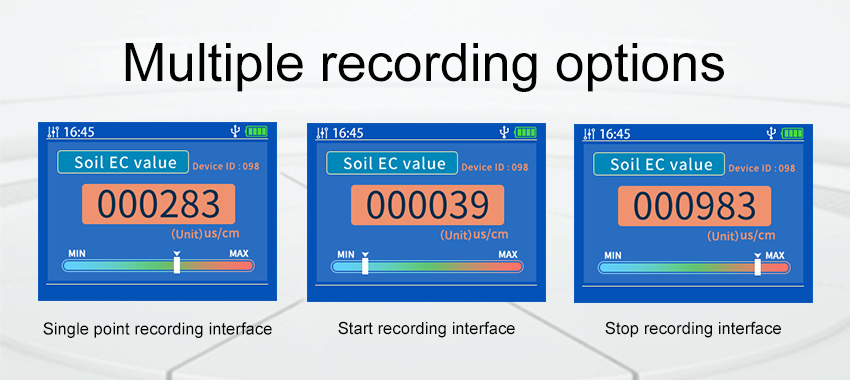Introduction:
In recent years, the global population has been steadily increasing, putting immense pressure on the agricultural sector to produce more food. To meet this growing demand, farmers need to optimize their crop yields. One crucial factor in achieving this is ensuring that the soil has the right balance of nutrients. Traditional soil testing methods can be time-consuming and expensive, making it challenging for farmers to monitor and adjust their soil’s nutrient levels regularly. However, the advent of portable Soil NPK (Nitrogen, Phosphorous, and Potassium) detectors has revolutionized the way farmers approach soil testing and nutrient management. These devices provide quick and accurate results, enabling farmers to make informed decisions and improve their crop yields.

The Importance of Soil Nutrient Balance:
Soil nutrients, particularly nitrogen, phosphorus, and potassium, play a vital role in plant growth and development. Nitrogen is essential for leaf and stem development, phosphorus promotes root growth, and potassium helps with overall plant health and resistance to diseases. Imbalances in these nutrients can lead to stunted growth, reduced yields, and increased susceptibility to pests and diseases. Therefore, maintaining the right balance is crucial for farmers to achieve optimal crop production.
Traditional Soil Testing Challenges:
Traditional soil testing methods involve collecting soil samples and sending them to a laboratory for analysis. This process can be time-consuming, taking several days or even weeks to receive results. Additionally, the cost of laboratory testing can be prohibitive for small-scale farmers, limiting their ability to monitor their soil’s nutrient levels regularly. As a result, farmers often rely on guesswork or general fertilizer recommendations, which may not be tailored to their specific soil conditions. This trial-and-error approach can lead to inefficient use of fertilizers, increased costs, and environmental pollution.
Portable Soil NPK Detectors:
Portable Soil NPK detectors offer a convenient and cost-effective solution to the challenges faced by farmers with traditional soil testing methods. These handheld devices use advanced technology to provide real-time measurements of soil nutrient levels. By simply inserting the detector into the soil and following the instructions, farmers can obtain accurate readings within minutes. The detectors utilize various methods such as ion-selective electrodes, optical sensors, or electromagnetic induction to determine the nutrient concentrations in the soil.

Benefits of Portable Soil NPK Detectors:
Time and Cost Savings: With portable detectors, farmers no longer need to wait for laboratory results, saving valuable time during critical stages of crop growth. Additionally, these devices are relatively affordable, making them accessible to small-scale farmers.
Precision Farming: Portable detectors enable farmers to adopt precision farming techniques by providing precise and localized nutrient measurements. This allows farmers to apply fertilizers only where and when needed, reducing waste and optimizing nutrient utilization.
Real-time Monitoring: Regular monitoring of soil nutrient levels is crucial for maintaining optimal conditions for crop growth. Portable detectors enable farmers to monitor their soil’s nutrient status frequently, allowing them to make timely adjustments and prevent nutrient deficiencies or excesses.
Customized Fertilizer Recommendations: By accurately measuring the nutrient levels in the soil, portable detectors can provide farmers with customized fertilizer recommendations. This ensures that the fertilizers applied are tailored to the specific nutrient needs of the crops and the soil conditions, leading to improved yields and cost savings.
Environmental Sustainability: Proper nutrient management is not only essential for crop productivity but also for environmental sustainability. By using portable detectors to optimize nutrient application, farmers can minimize nutrient runoff and pollution, protecting water bodies and ecosystems.
Case Studies:
Several studies have demonstrated the effectiveness of portable Soil NPK detectors in improving crop yields. For example, a study conducted in India showed that farmers using portable detectors achieved a 20% increase in wheat yields compared to those using traditional methods. Similarly, in Kenya, farmers using portable detectors reported a 30% increase in maize yields. These success stories highlight the potential of portable detectors in transforming agriculture and enhancing food security.
Conclusion:
Portable Soil NPK detectors have emerged as a game-changer in agriculture, empowering farmers with quick and accurate soil nutrient measurements. By enabling precision farming, real-time monitoring, and customized fertilizer recommendations, these devices have the potential to significantly improve crop yields and reduce environmental impacts. As the global population continues to grow, the adoption of portable detectors can play a crucial role in meeting the increasing demand for food while ensuring sustainable agricultural practices.